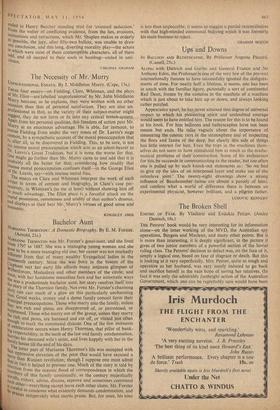The Necessity of Mr. Murry
UNPROFESSIONAL EssAYs. By .1. Middleton Murry. (Cape, 15s.) THEse four essays—on Fielding, Clare, Whitman, and the plays of Mr. Eliot—are labelled 'unprofessional' by Mr. John Middleton Murry because, as he explains, they were written with no other Occasion than that of personal satisfaction. They are also un- Professional in that, as the variety of their subject-matter might 4,1ggest, they do not form or fit into any critical trench-system. ',part from his personal qualities, this freedom of action puts Mr. Murry at an enormous advantage. He is able, for instance, to rescue Fielding from under the very noses of Dr. Leavis's siege 'moon, by a sympathetic account of the moral preoccupation that 's• after all, to be discovered in Fielding. This, to be sure, is not 1Ite intense moral preoccupation which acts as an admit-bearer to
,,
Leavis's Great Tradition, but it is none the worse for that. One might go further than Mr. Murry cares to and add that it is Probably all the bctter for that, considering how readily that intense moral preoccupation confuses itself—in the George Eliot of Dr, Leavis, say—with intense moral fuss. The essays on Clare and Whitman interpret the work of each writer in terms of content and biography, in Clare's, case per- %uasively, in Whitman'S (to me at least) without showing him off '0 much advantage. The Eliot piece is ,a forceful attack on the Floral pessimism, remoteness and aridity of that author's dramas, 'ld displays at their best Mr., Murry's virtues of good sense and humanity.
KINGSLEY AMIS


































 Previous page
Previous page